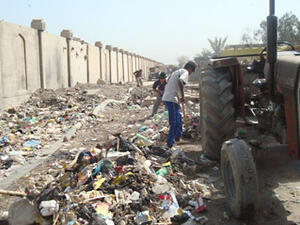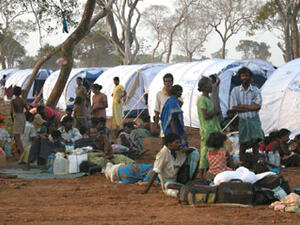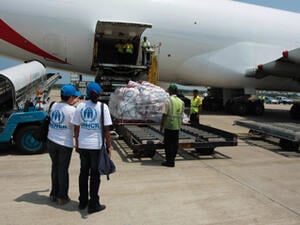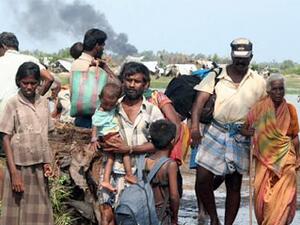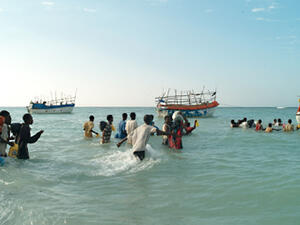Iraqis struggle to get by as Jordan tries to cope with influx
Iraqis struggle to get by as Jordan tries to cope with influx
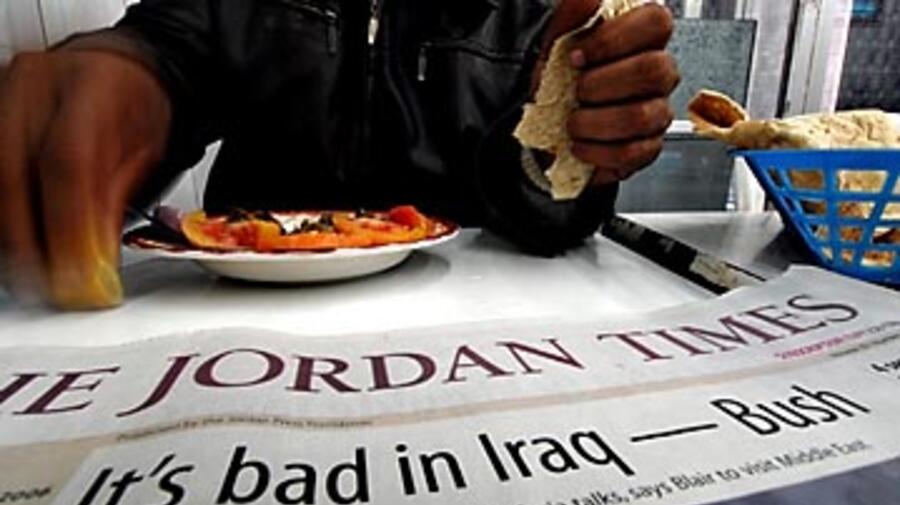
Catching up on the news in an Amman coffee shop. Young Iraqi men in the Jordanian capital keep a low profile, roaming the streets or hanging out in coffee shops.
AMMAN, Jordan, January 22 (UNHCR) - In a crowded alleyway in central Amman, Iraqis roamed quietly and tried not to attract attention. When they spoke, their eyes darted back and forth. Increasingly fearful, they said police were detaining more and more Iraqis residing illegally in Jordan.
Three grave-looking young Iraqi men in threadbare sweaters talked about their daily life in the Jordanian capital. Qais, a young artist, said they had been in Jordan for between eight and 14 years.
"We are registered as refugees by the UNHCR, yet we live each day as if it's our last here. We don't know when we will be detained, expelled, or beaten," he continued. "I tell you, it's not a life. It's only about surviving and praying not to return to Iraq."
Local authorities estimate the number of Iraqis living in Jordan to be between 500,000 and 700,000. While many were displaced before 2003, increasing numbers are fleeing to Jordan and other neighbouring countries and UNHCR expects the number to rise even further. "It is a deteriorating situation that is getting much worse," warned Robert Breen, UNHCR representative in Amman.
The influx is creating a host of problems and the Jordanian government says it cannot cope. Jordan is particularly worried about the security and economic fall-out and the strain on public services. The government began tightening security measures after a series of deadly bomb attacks in Amman in November 2005.
These prompted the authorities to limit the number of residency permits for Iraqis; detain Iraqis residing illegally in Jordan; and turn away Iraqis without proper documentations at the border. On the economic front, the Iraqi refugee crisis has helped double rents and push up the cost of food, transportation and gas.
High Commissioner António Guterres acknowledged the problems facing Iraq's neighbours while launching an appeal last week for US$60 million to fund UNHCR's work over the next year for the hundreds of thousands of uprooted Iraqis. Some of the money will be used in Jordan.
"The burden on host communities and governments in the region is enormous. It is essential that the international community support humanitarian efforts to help the most vulnerable people," he said.
"The neighbouring states are going through fatigue and exhaustion. They have security concerns, and general concerns regarding their internal politics," Breen added.
The Iraqis struggle to maintain hope amid this uncertainty. Some 21,000 Iraqis have registered with UNHCR in Amman, but the refugee agency believes many more people have not registered for different reasons.
Most refugees, like Ra'ed, are jobless and have hardly any money. Ra'ed spends most of his days hanging out with other young, unemployed Iraqi men. They like to drink extra sweet mint tea in a coffee shop that reminds them of Baghdad.
They also gather to share bad news: a brother killed on the border; someone stabbed; tension between a husband and wife over financial problems. Every now and again there is a silence as they remember friends and relatives left behind in Iraq.
Many Iraqis also suffer from health problems. "There is a great deal of pressure on the health care system, whether it stems from an increase in the domestic population or those coming from abroad," said journalist Hanan al Kiswany.
Public schools are also overcrowded. "The government is renting buildings and using them as schools," said Swasan Aruri, a senior programme officer at the German Development Bank (KFW), which has built 34 schools. "The students are attending school in shifts - morning and afternoon," she added.
The issue of school enrolment is causing tension between the local population and the refugees. There is also evidence of sectarian tension.
Omar Shawkat, who arrived in Amman with his family last year, said he had been unable to place his four school-age children because he could not present proof of residency. The youngsters have missed a year of schooling and spend their day watching television and sleeping late into the afternoon.
"I feel like my children have no future," said Shawkat, who lost a leg and a hand during the 1980s Iraq-Iran war. Even if he was allowed to work, he doubts he will find a job because of his disability. "I lost a leg. My hand does not function. My children don't go to school. I am not a registered refugee. I have no job. I have documents to prove everything that I am saying - so isn't this a humanitarian catastrophe?"
By Rana F. Sweis in Amman, Jordan



